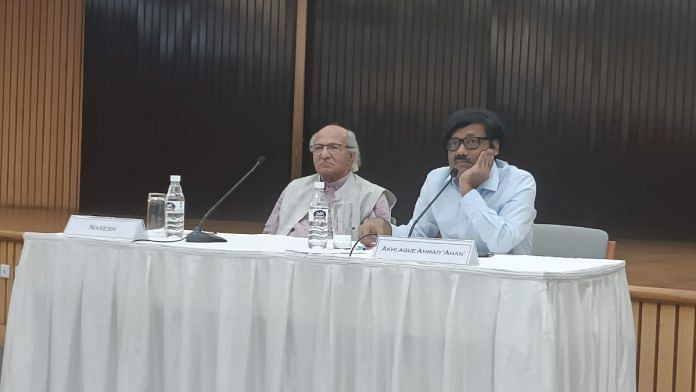New Delhi: What’s a bigger, more relevant Mughal-era legacy — Akbar’s brand new religion Din-i-ilahi or Dara Shikoh’s unifying work
It’s a historian’s quest, but one that is also wrapped in contemporary politics.
In fact, Dara Shikoh was critical of Din-i-ilahi. A delightful evening of ideas opened up when Dr Naresh spoke at the Daya Krishna lectures on philosophy at the India International Centre in New Delhi. He was joined by Professor Akhlaque Ahmad Ahan, professor at Jawaharlal Nehru University (JNU). The audience comprised poets, writers, literary critics, and history enthusiasts.
Akbar, though an illiterate emperor, had the curiosity to learn about different religions. That’s how he arrived at Din-i-ilahi, a combination of all the theological ideas that fascinated him. His great-grandson Dara Shikoh, though, would completely disagree with him a few decades later.
“Akbar wanted to create one religion for all the communities of India, while Dara Shikoh did not want to create a religion, he wanted to unite religious communities. This is the difference,” said Naresh, a former professor of modern literature at Panjab University and chairman of the Chandigarh Academy of Letters.
In Dara Shikoh’s translation of Upanishads titled Sirr-i-Akbar, the Mughal prince criticised his great-grandfather. “Akbar had relations with mullahs of every religion. He wanted to combine them all and make one thing. Many past thinkers have opposed this, including Dara Shikoh,” said Akhlaque Ahmad.
He also pointed out an interesting fact: The term Din-i-Ilahi wasn’t used in Akbar’s time—there is no mention of it anywhere in the 200 years after the emperor ruled.
Dara Shikoh, the eldest son of Shah Jahan and a Vedanti Sufi, was known to have a penchant for truth and spiritual philosophy that brought different religious traditions together.
Naresh said that Aurangzeb, the eldest of the brothers who murdered Dara and called him an infidel, had reservations about his brother’s philosophical ideas. “He knew that Dara had no military adeptness at all. But Aurangzeb was afraid of Dara’s thinking because his thinking was becoming acceptable among the people of India. When Dara was being paraded in the streets, people were beating their chests and mourning,” said Naresh.
Today, Project Dara Shikoh has gained new momentum in Modi’s India. New books, street names, and research chairs at universities are pulling the Sangh Parivar’s favourite Mughal out of the margins of history and ascribing a centrality that is worth emulating.
Also read: Dara Shikoh has become modern-India’s symbol of unity—it’s also why he lost to Aurangzeb
How Dara Shikoh’s legacy thrived
Dara was born in Ajmer and was known to be a faqir (ascetic) in the true sense of the term. Naresh mentioned that Dara’s philosophical ideas developed most when he read the Vedas and Upanishads. After his assassination in 1659, his legacy lived on through popular culture and folklore.
About 200 years later, Naresh narrated, Munshi Kanhaiyalal Alakhdhar, an anti-Muslim Arya Samaji, became so enamoured with Sirr-i-Akbar that he translated it from Persian to Urdu. The book was published in 1864.
In 1941, a Punjabi Brahmin man named Teluram chanced upon the book and became obsessed with it and spread its word.
Naresh, too, has attempted to translate the book from Urdu to Hindi. “Dara noticed two things. Unity of one Brahma and harmony of all religions,” he said, adding that this was part of the Mughal prince’s ordination, which he acquired from Armenian poet Sarmad Kashani and Islamic mystic Mian Mir.
For the professor, the relationship of an individual with God is a very personal matter. “Harmony among all religions is not only the need of the hour but it should always be there. India, in particular, and the world need the thinking of Dara Shikoh because that is a combination of Vedanta and Tasawwuf (Sufism),” he said.
In Dara’s eyes, both Hinduism and Islam have the same philosophical basis.
“In Hinduism, there is a concept of Eko Brahma dwitiyo na asti [one god no other god], Islam too believes in the same. So then why are there two of them?” Naresh said.
(Edited by Humra Laeeq)



